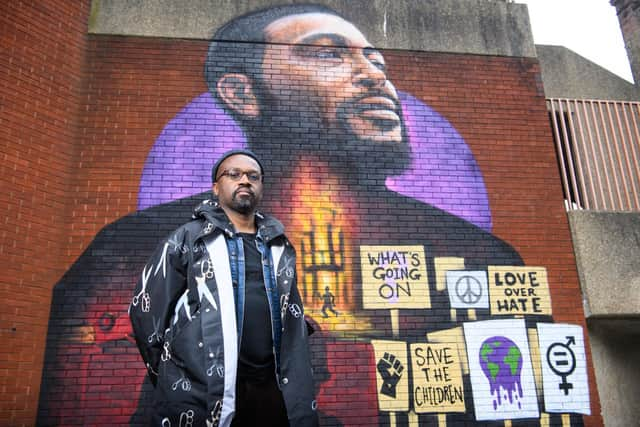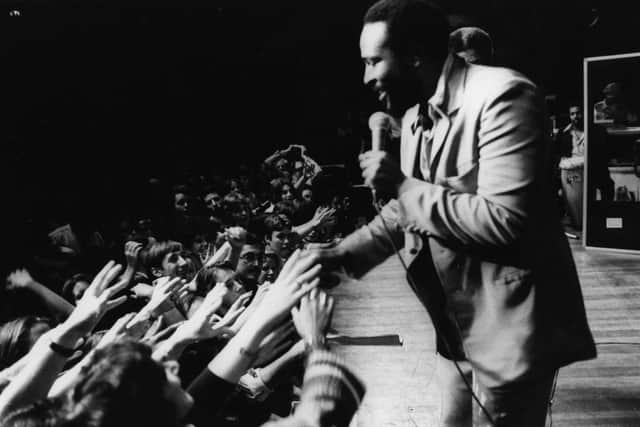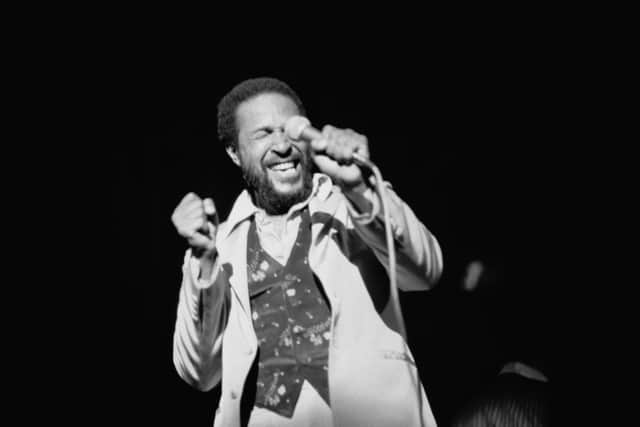COP26: Marvin Gaye's album What's Going On has lessons for the fight against climate change 50 years after its release – Professor Mark Banks
Panellists including singer-songwriter Emeli Sandé and the DJ and presenter Trevor Nelson assessed the album’s profound aesthetic innovations, its continued significance for society and politics and – in the first week of the United Nations’ COP26 climate summit – its influence on black (and other) ecological consciousness.
What’s Going On is a vital touchstone because it was the first black music record to so openly and sustainedly confront issues of racism, war, unemployment and the ecological damage being occasioned by deeply troubled and unequal societies.
Advertisement
Hide AdAdvertisement
Hide AdMarvin Gaye, enduring his own personal crises, had become acutely sensitive to these concerns and perfectly caught the new decade’s feverishness and mood of crisis.
Today, with even the most mainstream environmental organisations arguing “no climate justice without racial justice”, its more widely accepted that creating a safe and secure future means not just tackling climate change but reducing social inequalities and improving life chances for everyone. What’s Going On stands as a reminder that black communities and black artists were long ago making this argument.
The initial success of What’s Going On was not simply that it had political resonance. It was also immediately recognised as an astoundingly beautiful and accomplished album, a work of art, one that was as aesthetically advanced as any recording of its era. In its suite-like, conceptual presentation it completely changed the consensus opinion about what black music and black artistry could achieve.
Yet if the music and the message sounded urgent and prescient in 1971, what’s astounding is that they seem almost more vital today. Sonically, the album seems barely to have dated and, in Inner City Blues (Make Me Wanna Holler), Gaye gives us the wonderful opening line, “Rockets, moon shots/ Spend it on the Have Nots” – a lyric just as relevant in 2021, as we see billionaires now enthusiastically launching themselves into space.


“Crime is increasing/ Trigger-happy policing/ Panic is spreading/ God knows where we’re heading,” Gaye sings in the same song, and the parallels between then and now seem further underlined.
Mercy, Mercy Me (The Ecology) offers a direct lament on behalf of the ravaged Earth – “poison is the wind that blows” – at a time when the idea of ecological concern, and especially black ecological concern, had scarcely been registered.
On the title track itself, Eli Fontaine’s lithe and sinuous sax intro anticipates Gaye’s melancholic plea for some calm and communication in the wake of worsening social polarisation, violence and brutality. Once again the distance between then and now seems effaced.
Famously, Motown boss Berry Gordy was no fan of What’s Going On – he was concerned it would kill Gaye’s career and threaten the label’s positive reputation as “The Sound of Young America”.


Advertisement
Hide AdAdvertisement
Hide AdYet, contrary to Gordy’s fears, the record was both a huge success and opened the door for others who combined the soulful with the socially conscious – Sly Stone and Stevie Wonder to name but two – and inspired many black music auteurs and activists to come.
Public Enemy, Prince, Lauryn Hill, D'Angelo, Kendrick Lamar, Janelle Monae, John Legend, are all in some way indebted to Gaye and What’s Going On. Legend performed the entire album at the Hollywood Bowl in 2014, describing it as “a landmark of social commentary”. In 2020, What’s Going On was played at the protests in Minneapolis and Kenosha, Wisconsin and it continues to be heralded as one of the foundational, inspirational songs for Black Lives Matter.
The reason why What’s Going On has no question mark in its title is that it was consciously conceived as a statement rather than a question. Gaye was not only diagnosing ills, but proposing solutions: unity, togetherness, spirituality, care and community – these were the routes out of the mess. Nothing less than a fundamental renewal of society and its values was going to be required.
Last night’s event was a highlight of the University of Glasgow’s The Dear Green Bothy project – a free public arts programme showcasing different creative and critical responses to climate emergency.


The project has brought together dozens of artists, academics and members of local and diverse communities to create many new events and works of art. Musicians, gamers, poets and writers, and people who have never made art before, are combining to tell the story of how climate change is already profoundly affecting our everyday life.
Their works and stories testify to the urgent threats and dangers that lie ahead; but also offer hope, and some wonderful plans and ideas for securing our shared and sustainable future.
Research shows that progressive change is possible when the message is hopeful and there is something positive to believe in – and arts and culture are often vital in supporting that belief.
What’s Going On had a critical message, but it also showed how we could work together to positively transform society. Fifty years later it continues to remind us that it won’t necessarily be science that saves us, or our leaders, but ourselves together, working to realise what Marvin Gaye called the “common vibrating tone” of our collective life.
Advertisement
Hide AdAdvertisement
Hide AdMark Banks is professor of cultural economy at the University of Glasgow and the lead academic for The Dear Green Bothy programme. A recording of last night’s discussion about Marvin Gaye’s album What’s Going On, featuring Emeli Sandé and Trevor Nelson, is available at deargreenbothy.gla.ac.
A message from the Editor:
Thank you for reading this article. We're more reliant on your support than ever as the shift in consumer habits brought about by coronavirus impacts our advertisers.
If you haven't already, please consider supporting our trusted, fact-checked journalism by taking out a digital subscription.
Comments
Want to join the conversation? Please or to comment on this article.
